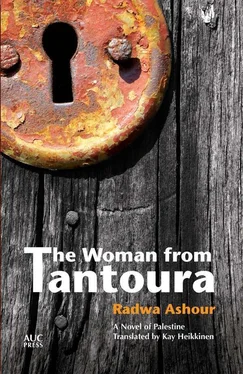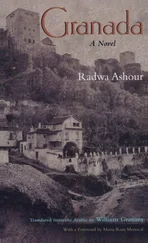“Can you visit Tantoura and take some pictures?”
“Hasan asked me that, and I did it.”
“You visited it?”
“I did.”
I nearly asked her to tell me what she saw, but I refrained. What would I ask about?
Maryam remarked on my absorption in preparing for the visits of Wisal and Hasan’s wife, “Are they coming to us from a famine?” She laughs; I answer, “This is our way to honor a guest!”
I buy meat and chicken, and clean it, season it, and put it in the freezer. I think, the leg of lamb for the first day, and I’ll stuff the breast for the second day. The chicken for the following day. I think, Wisal likes mulukhiya soup and okra; I buy them. I pull the leaves off the mulukhiya and remove the stems of the okra, and wash them. I let them dry two hours and then I put them in the refrigerator. I buy grape leaves and summer squash; I roll the grape leaves, and put off the squash until later. I make bread dough, form it into a ball, and let it rise, while I prepare the spinach stuffing; I fill the discs and put them into the oven. Every time I finish baking one set of the tarts Maryam eats a quarter of them. I scold her: “You’ll finish them off before the guests come!” She pays no attention, and I shoo her away, and she comes back. I think, Fatima likes pickled eggplant. I buy small black eggplants and stuff them with walnuts and pepper, then I put them with lemon juice and olive oil in two large glass containers. “And the kubbeh?” asks Maryam. “For sure the guests will like kubbeh!” I laugh; for sure Maryam likes kubbeh! I soak the cracked wheat kernels, grind the meat and season it; I form the meatballs and stuff them, and put them in a plastic bag in the freezer. I go to the grocer, thinking I’ve forgotten such-and-such, then I go again. I go to the fruit seller and buy, then I buy again. I mutter, “What’s missing?”
As soon as we entered the house I asked Maryam to make us coffee, but Wisal said, “Put off the coffee, Ruqayya, let’s put the things away first.” She rolled up her sleeves and took one of the two suitcases she had brought to the kitchen, the larger one. She squatted down beside it and started to take out the food she had brought. She handed me three plastic bottles, tightly sealed, containing olive oil, and three others in which she had put olives. She said, “I have a neighbor in the camp with a daughter-in-law from Egypt. I tell you, I went to visit her and have coffee with her, to ask her. I said, ‘What do they lack in Egypt? Should I take okra and mulukhiya?’ The Egyptian laughed and said, ‘There’s nothing more plentiful than okra and mulukhiya in Egypt.’ I said to her, ‘Oil and olives from our trees, I would take that to Ruqayya even if she were living in an oil press!’ Then I asked her about the things that aren’t available and she told me.” She brought out a big plastic jar: “Naboulsi cheese.” It was hard, molded pieces of cheese lined up in a jar, in three layers. I began to wrap up each set of pieces and put them in a plastic bag in the freezer, leaving out six to soak in water, to remove some of the salt. Then the bags: domestic thyme, dried and mixed with sesame and sumac; green thyme; sage; sumac; dried wheat grains. Last there was a large bag; Wisal laughed jovially. “I would have made musakhan, if it weren’t for the distance — the bridge, then Amman, then Cairo, then Alexandria; I thought it would spoil. My neighbor’s Egyptian daughter-in-law told me, ‘Take sumac; in Egypt they don’t know it and don’t use it.’ I asked, ‘How do they make musakhan?’ She said, ‘We don’t know it.’ So I decided to buy you some bread from our ovens.”
Wisal had even brought bread from the old ovens with her from Jenin.
Maryam laughed and said again, “It’s obvious we’re in a famine, Auntie Wisal!”
I said, “We aren’t in a famine, but we love the food from home. If you don’t want it, leave it for me.”
She retreated hurriedly, “I want it and then some! When will you make us musakhan, Auntie Wisal?”
“Now, if you like.”
“No, now you’ll drink coffee.”
We sat on the balcony. Wisal said suddenly, “Ruqayya, I haven’t seen the sea of Jaffa since we left Tantoura!”
A passing story, one of thousands of little anecdotes that pass by every day, only to fall into the crowd. Suddenly it surfaced; I recalled it, and then I ruminated on it, saying why not? The man was over a hundred and I haven’t even reached seventy. The story gave me ideas; I would have liked to hear it again from Karima, in case she could add other details that had escaped her.
It was the story of her father’s uncle, Abu Khalil. He left for Lebanon with them, and stopped like them in Rumaysh. He went back across the border with them, heading for Saffurya, and was arrested with them and put in prison in Acre. From prison they sent them to Lebanon, and the Lebanese authorities put them in Qaroun, taking them from there to Ain al-Helwa. Karima said, “We were in Ain al-Helwa when Abu Khalil announced that he was going back. My grandfather said, ‘How will you go back? They’ll kill you on the borders, or imprison you and send you back again.’ He said that he was determined: ‘If you want to come with me you’re welcome, but if you decide to stay, then I’m going.’ ‘Will you go alone?’ He said, ‘My father and mother are there, and my first son and his daughter.’ He was referring to the dead in his family, so the adults thought he had lost his mind. Then one day we woke up and couldn’t find him. We thought he had lost his way to the camp — I said he was over one hundred, and he might even have been 110. We looked for him in Ain al-Helwa and in Sidon, there was no one we didn’t ask. A week went by with no news, not a thing. Then we heard that he had bought a donkey and gone back. We didn’t rest until we found the man who had sold him the donkey and the person who showed him the way out of Sidon. We nearly accepted that the Israelis had killed him on the borders or that he had died; how could a man over a hundred cross the border alone, sleeping under an olive tree, with no provisions and not even a drink of water? He didn’t have a penny to his name, because he had paid everything he had for the donkey, and everything his wife had, too (she discovered after he left that he had taken the few liras she had hidden in the mattress). His wife said, ‘Don’t worry, he’ll manage.’ My grandmother condemned her sister-in-law’s words when she was alone with my mother, and said she had a heart of stone. ‘How can she sleep all through the long night when her husband is wandering among the hyenas and the soldiers of that state? For shame, a man of a hundred, and his wife just lets him do as he pleases! If I were in her shoes I would go to him.’ We little ones began to make jokes about what she said, imitating my grandmother’s words mockingly, because the woman she wanted to take care of her husband was over eighty and toothless; she had to lean on our shoulders when she wanted to go from her house in the camp to our house next door. The family gave up on Grandfather Abu Khalil, and accepted that he must have died on the way or been killed. Four years later, when new refugees thrown out by Israel began to come to Lebanon, we learned that Grandfather Abu Khalil was still among the living. Someone from around our village said that he had seen him, and that he lived in the cemetery of Saffurya and said that he was the cemetery watchman. We asked how he managed, and they said, ‘We don’t know, but he was in good health, smoking and insisting on inviting anyone who visited the cemetery to a cup of tea!’ My grandmother talked it over with my mother, and said, ‘For sure Abu Khalil went back to get rid of his wife, because she’s spiteful and miserly and no one can put up with her.’”
Читать дальше












